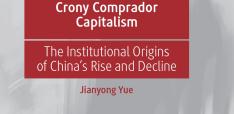The Challenge of Deglobalization: Countries must close the rural-urban divide to succeed in a new economy

Kyle Scott argues that countries that can foster equitable rural and urban development will be best placed to tackle deglobalization.
Almost at the outset of the COVID pandemic we recognized the fragility of the global supply chain. Whether it was the immediate need for toilet paper, or the lingering effects of semiconductor shortages, we now recognize that a global supply chain is susceptible to disruption. Maintaining a global supply chain, we have found, is far easier than getting it started again once it has been disrupted. And the disruptions show no signs of abating. The war in Ukraine is showing us the fragility of our food supply and the global energy market has shown us how impossible it is to disintermediate politics from commerce, and outsourcing production to poorer countries has proven unethical and unstable.
Businesses and colleges reacted to supply chain disruptions by hiring and training logistics and supply chain professionals. This was the obvious answer to an immediate need. But the global shutdown also accelerated deglobalization. Deglobalization demonstrates a recognition that localized economies face a lower threat from global disruptions. Additionally, localized economies have a lower carbon footprint given the reduced distance from source to consumer. There is no chance that the world economy becomes completely deglobalized, but there is an opportunity for economies to localize more effectively and ethically by narrowing the rural-urban divide.
Rural areas are usually seen as places for raw material extraction, cheap land, and cheap labor to produce goods for urban centers. Produce, oil, livestock, windfarms, and timber all exist within rural areas and the primary consumers are in urban centers. Meanwhile, urban centers are seen as places of commerce and innovation. Rural areas are romanticized, but urban areas are glamorized. When we think of succeeding financially or making scientific advancements, we seldom think of leaving a city for an open swath of land. This is dehumanizing for those living in rural areas and ignores the potential of those who do not live in urban centers. Differences in economic development yield differences in political and social interests as well. Divergences in economic, political, and social interests can have destabilizing effects.
Businesses already recognize that rural areas offer cheaper land and labor compared to urban centers. As deglobalization accelerates, the exploitation that characterized aspects of globalization will continue domestically. With globalization companies recognized they could produce goods more cheaply in one country rather than another, so they moved production abroad. Deglobalization requires onshoring jobs. Companies will open production and distribution centers in rural areas—as they already have—while keeping more financially lucrative jobs in urban centers. Government officials and policy makers enable this behavior by providing labor training programs through rural universities and trade schools rather than bolstering programs aimed at training computer scientists, engineers, accountants, and entrepreneurs through rural institutions.
If the concern about providing economic opportunity, reducing inequality, securing supply chains, and reducing carbon emissions is sincere, the solution is to fund rural areas in new ways. For instance, when it comes to agricultural innovation, rural areas need to be the areas where the innovation occurs, not just the place where it is applied. Phronesis is the Greek term, usually attached to Aristotle, that values practical wisdom. This is the wisdom developed through practice. Someone can have knowledge of mathematics or science, but knowing how to apply that knowledge properly in a given context only comes through lived experience. It seems the appropriate policy, then, is to provide advanced skills in mathematics, science, engineering, and business to those who have the lived experience of farming and agriculture.
If we are to develop more sustainable means of food production it can only come from those who have a connection to ranching and farming. Teaching engineering to a kid who grew up on a farm is more practical than providing an urban-based engineer decades of farming experience. Having a new idea of food come from people disconnected from the natural environment and then imposed on the market is unlikely to succeed as we have seen companies in this space falter. The promise of technological advances in land management, water use, and sustainable farming will come from those with some history of working and living in that environment who have also been provided an advanced education in science, engineering, mathematics, and business.
With all the resources deployed to create centers of innovation and entrepreneurship in urban areas, some of this could be redirected to rural areas. Some of the money that is spent on the current training programs in rural areas should be redirected to training engineers, chemists, entrepreneurs, data scientists, and, yes, supply chain experts, in rural areas. Deglobalization is unrealistic, or at least exploitative, if we do not invest in new ways in our rural areas and its residents.
Not all countries will face these challenges. Deglobalization poses a different set of challenges for countries whose economies are dependent upon exports, labor, or natural resource extraction. In fact, they face almost the reverse problem, but they must still remain cognizant of the rural-urban divide to ameliorate the inevitable deleterious effects. The countries that can develop production, innovation, and consumption equitably between rural and urban areas will have economic, political, and social advantages over those that allow the divide to grow.
Kyle Scott, PhD, MBA, is an Assistant Professor of Entrepreneurship at Sam Houston State University. He has authored five books and more than one hundred articles on public policy, ethics, and innovation. kyleasc@gmail.com Twitter: @profkylescott
Photo by Pok Rie


